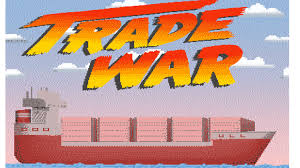Trump Poised to Escalate China Trade War Even Further Within Hours

The president’s litany of tweets also followed the release of prepared remarks by Fed Chairman Jerome Powell at the Kansas City Fed’s annual symposium in Jackson Hole, Wyoming. Powell said in his speech that the U.S. economy is in a favorable place but faces “significant risks” as growth abroad slows amid trade uncertainty.
“As usual, the Fed did NOTHING! It is incredible that they can “speak” without knowing or asking what I am doing, which will be announced shortly,” Trump said.
“My only question is, who is our bigger enemy, Jay Powell or Chairman Xi?” Trump added, referring to Chinese President Xi Jinping.
China’s newest tariffs came earlier Friday in retaliation for Trump’s latest planned levies on Chinese imports that have pushed U.S. stocks and commodities lower. The move takes aim at the heart of Trump’s political support — factories and farms across the Midwest and South at a time when the U.S. economy is showing signs of slowing.
The news from Beijing rekindled concerns about the world’s two largest economies and a global growth outlook that’s already looking shaky.
Some of the countermeasures will take effect starting Sept. 1, while the rest will come into effect from Dec. 15, according to the announcement from China’s Finance Ministry. This mirrors the timetable the U.S. has laid out for 10% tariffs on almost $ 300 billion of Chinese shipments.
China will put an extra 5% tariff on American soybeans and crude-oil imports starting next month. The resumption of a suspended extra 25% duty on U.S. cars will resume Dec. 15, with an additional 10% on top for some vehicles. With existing general duties on autos taken into account, the total tariff charged on U.S.-made cars would be as high as 50%.
The U.S. Chamber of Commerce called China’s move “unfortunate but not unexpected.”
“The fact of the matter is that nobody wins a trade war, and the continued tit-for-tat escalation between the U.S. and China is putting significant strain on the U.S. economy, raising costs, undermining investment, and roiling markets,” Myron Brilliant, the chamber’s head of international affairs, said in a statement.
After Trump gave the go-ahead earlier this month for tariffs on the almost $ 300 billion in Chinese imports that haven’t been hit by higher duties, China halted purchases of agricultural goods and allowed the yuan to weaken.
Possible Actions
It isn’t clear what action Trump might take. Inside the White House, hawks have been pushing for a direct intervention in currency markets by the Treasury by pointing to a slowdown in U.S. manufacturing, which many economists have blamed on tariffs imposed by Trump and uncertainty surrounding his trade war with China.
Just how effective a Fed cut or an intervention would be is unclear. The relevant Treasury fund has $ 92 billion in it. Even if the Fed were to join in, as it has in past interventions, and match that amount, a $ 180 billion injection into a $ 5 trillion per day global foreign-exchange market might have a limited effect. It might also unnerve markets and have longer-term economic consequences.
Or, Trump could turn back to his favorite tool, tariffs, and double down on his threat to impose import taxes on all remaining imports from China, or some $ 300 billion in annual trade, by raising the levies he vowed to impose Sept. 1 from 10% to 25%.
Beyond that, the administration could raise further barriers to Chinese investment in the U.S. or target China’s energy supply by revoking waivers that allow Beijing to continue purchasing oil from Iran and Venezuela. Trump could also take steps to further isolate Huawei Technologies Co., which the U.S. deems a security threat, in its bid to supply 5G technology in the U.S. Or, Trump could take a harder line against Beijing over human rights and the autonomy of Hong Kong, where protests have raged for weeks.
Fentanyl Order
U.S. and Chinese negotiators have spoken by phone and are planning another call in coming days. People familiar with their intentions previously said that the Chinese delegation is sticking to their plan to travel to the U.S. in September for face-to-face meetings, which may offer a chance for further reprieve.
Trump also ordered mail carriers to search for deliveries of the drug fentanyl coming from China.
“Also, I am ordering all carriers, including Fed Ex, Amazon, UPS and the Post Office, to SEARCH FOR & REFUSE” deliveries of the illegal drug. It isn’t clear what the carriers’ responsibilities are in halting those shipments, which have helped fuel an opioid epidemic in the U.S.
Stopping shipments of illegal fentanyl that enter the U.S. is a job that typically falls to government agencies such as the Drug Enforcement Administration, Food and Drug Administration and Customs and Border Protection.
Illegal Chinese fentanyl is increasingly entering the U.S. through the Mexico border via drug traffickers instead of being sent directly. It’s unclear if Trump also wants to stop legal fentanyl, often used by cancer patients to treat pain, from entering the U.S. as well, which would cause an outcry from patients.
More must-read stories from Fortune:
—The economy is in code yellow for a recession based on these 9 metrics
—The death of trading: Why more big banks think the business is a losing bet
—Recession watch: 3 ways to reframe your thinking about the next downturn
—What are negative interest rates and why is everybody so worried about them?
—Why WeWork won’t be in the S&P 500 after its IPO


